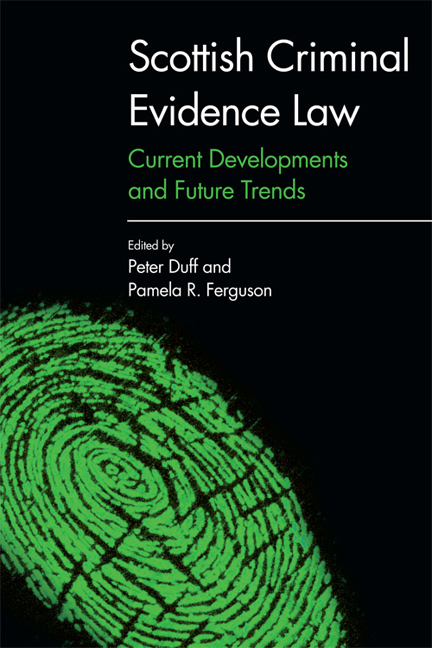Book contents
- Frontmatter
- Contents
- The Contributors
- Acknowledgements
- Table of Cases
- Table of Legislation
- Introduction
- 1 Cadder and Beyond: Suspects’ Rights and the Public Interest
- 2 ‘Access to Justice’ for Complainers? The Pitfalls of the Scottish Government’s Case to Abolish Corroboration
- 3 The Relevance of Sexual History and Vulnerability in the Prosecution of Sexual Offences
- 4 ‘Similar Fact’ Evidence and Moorov: Time For Rationalisation?
- 5 Hearsay in Scots law: Rethinking and Reforming
- 6 Eyewitness Identification Evidence and its Problems: Recommendations for Change
- 7 Assessing Witness Credibility and reliability: Engaging Experts and Disengaging Gage?
- 8 The process of Criminal Evidence Law Reform in Scotland: what Can We Learn?
- 9 Scottish Criminal Evidence Law Adrift?
- Bibliography
- Index
1 - Cadder and Beyond: Suspects’ Rights and the Public Interest
Published online by Cambridge University Press: 24 April 2021
- Frontmatter
- Contents
- The Contributors
- Acknowledgements
- Table of Cases
- Table of Legislation
- Introduction
- 1 Cadder and Beyond: Suspects’ Rights and the Public Interest
- 2 ‘Access to Justice’ for Complainers? The Pitfalls of the Scottish Government’s Case to Abolish Corroboration
- 3 The Relevance of Sexual History and Vulnerability in the Prosecution of Sexual Offences
- 4 ‘Similar Fact’ Evidence and Moorov: Time For Rationalisation?
- 5 Hearsay in Scots law: Rethinking and Reforming
- 6 Eyewitness Identification Evidence and its Problems: Recommendations for Change
- 7 Assessing Witness Credibility and reliability: Engaging Experts and Disengaging Gage?
- 8 The process of Criminal Evidence Law Reform in Scotland: what Can We Learn?
- 9 Scottish Criminal Evidence Law Adrift?
- Bibliography
- Index
Summary
INTRODUCTION
In a system of criminal law and justice still underlain by the common law, such as Scotland’s, individual cases do, on occasion, effect major change in legal principle. It is less usual, however, for such cases to have an instant and seismic effect on practice as did the Supreme Court's decision in the case of Cadder v HMA in 2010, though this judgment was not unexpected. In their blog, MacQueen and Wortley described it as ‘a major decision shaking the Scottish criminal justice system to its roots’. The case concerned the system of ‘detention’ for police questioning then operating in Scotland in the earlier stages of the criminal process (before arrest and charge) and its conformity to the article 6 fair trial guarantees of the European Convention on Human Rights. Cadder decided that the treatment of suspects at the initial interview stage in Scotland was not adequate to ensure their right to a fair trial under art 6(3)(c) – the right to ‘defend [one] self in person or through legal assistance of [one’s] own choosing or, if [one] has not sufficient means to pay for legal assistance, to be given it free when the interests of justice so require’ – read in conjunction with art 6(1)'s more general right to a fair trial.
There has already been extensive discussion, highlighting both positive and negative aspects of the merits of, and necessity for, the Supreme Court decision so the chapter is less concerned with this matter. Cadder also provoked considerable, and ultimately worthwhile, soul-searching both as to the changes to the law required by the judgments and, more reflectively, as to the fit of the rights accorded to a suspect in the preliminary stages of an investigation with the overarching framework of the criminal justice system which also accommodates the interests of victims. This issue, of the balance of the rights of suspects with victims’ interests, and the relationship to the public interest which takes account of both is discussed more fully here.
The High Court has held that the course of justice in an individual case starts at the very beginning of a police investigation even when it is not entirely clear whether an incident constitutes a crime.
- Type
- Chapter
- Information
- Scottish Criminal Evidence LawCurrent Developments and Future Trends, pp. 18 - 40Publisher: Edinburgh University PressPrint publication year: 2017



